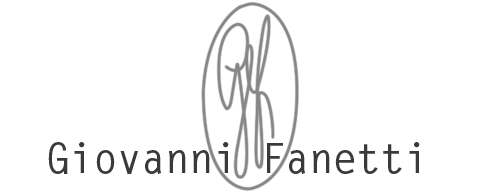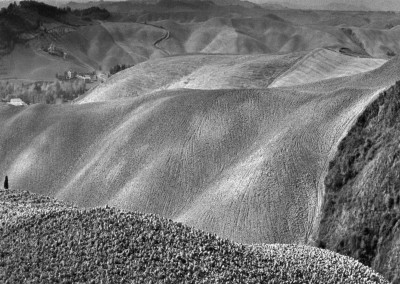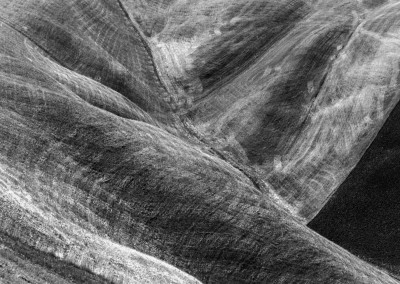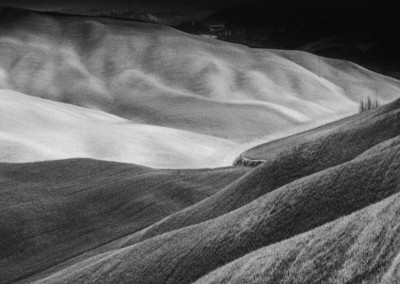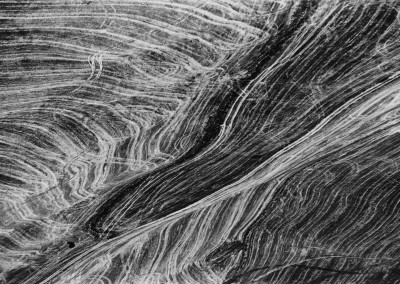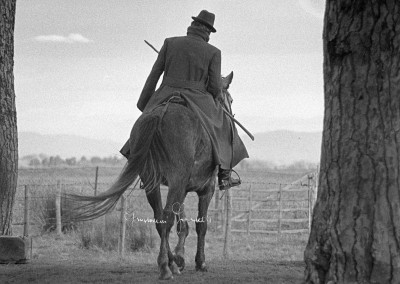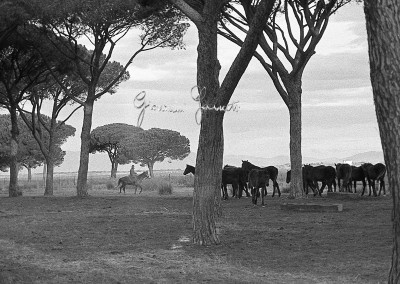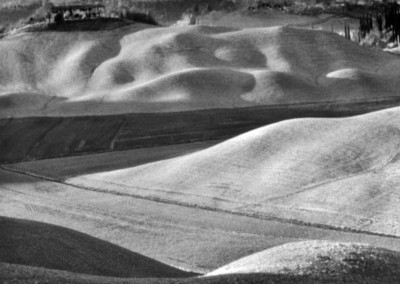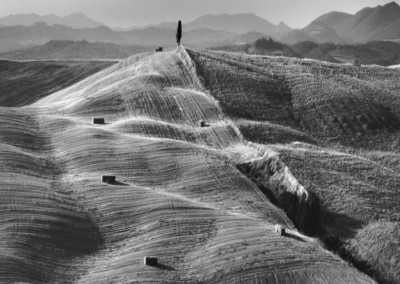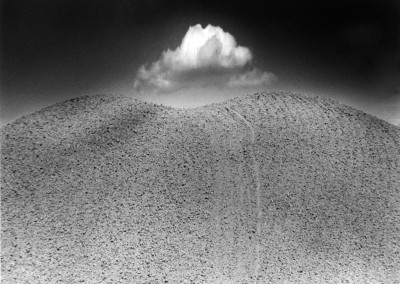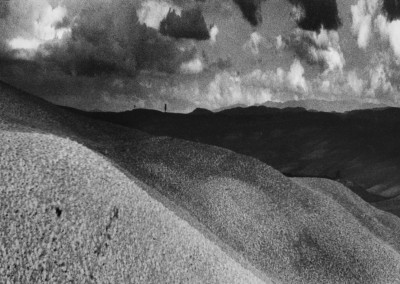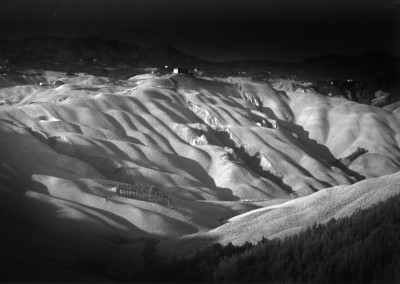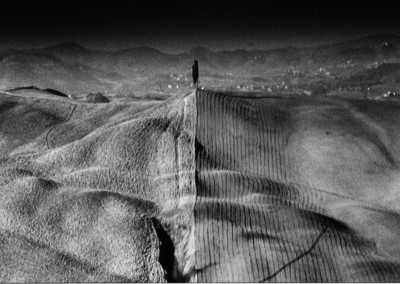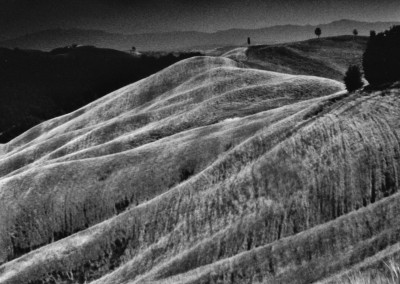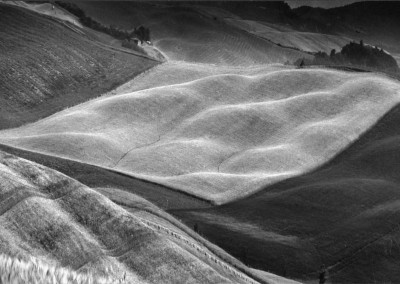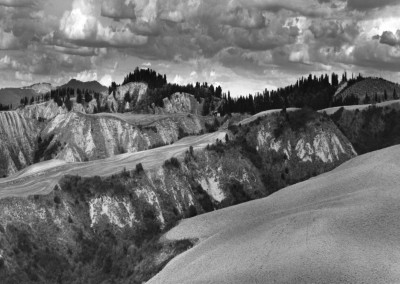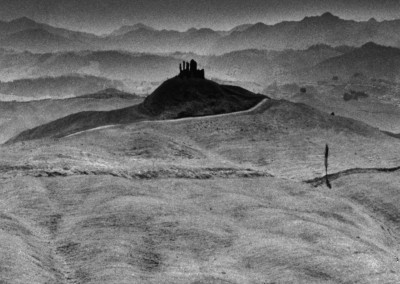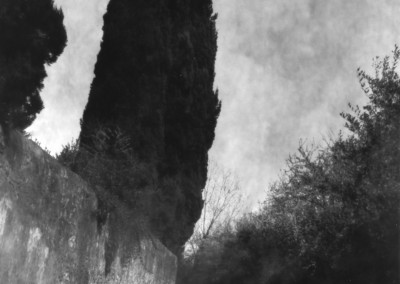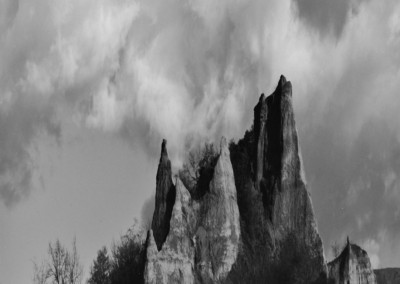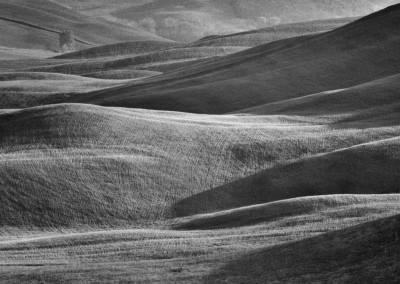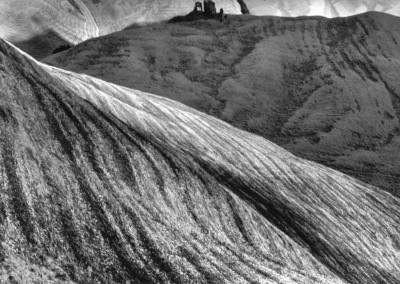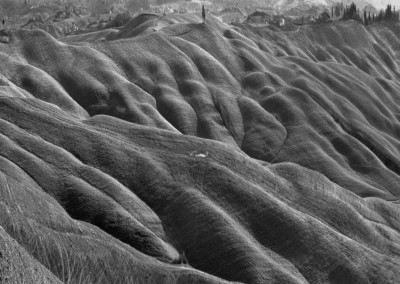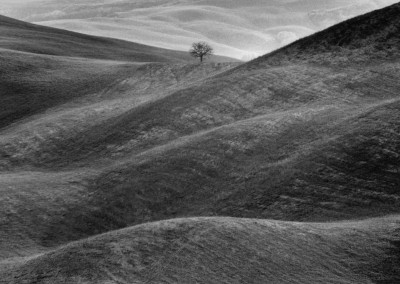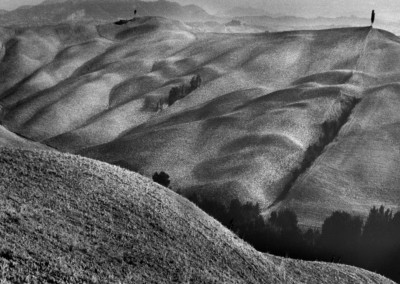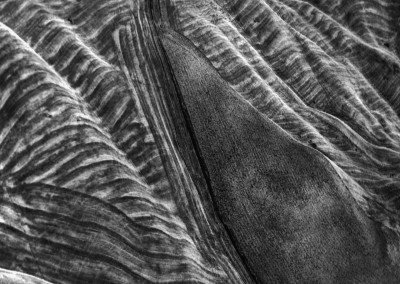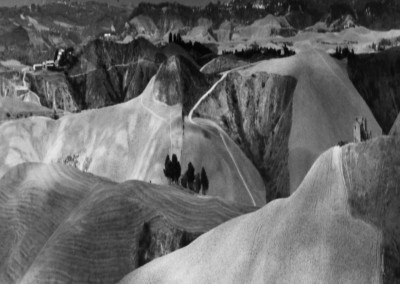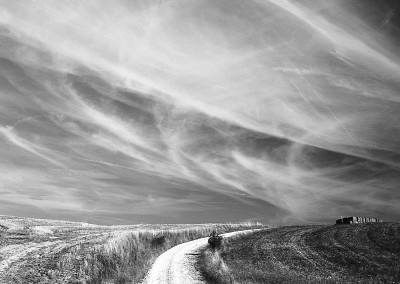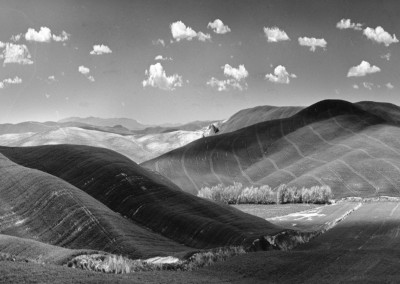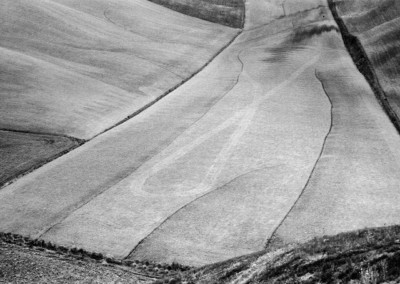Paesaggi 1989 – 2014
E’ in noi che i paesaggi hanno paesaggio. Perciò se li immagino li creo; se li creo esistono; se esistono li vedo. (…) La vita è ciò che facciamo di essa. I viaggi sono i viaggiatori. Ciò che vediamo non è ciò che vediamo, ma ciò che siamo.
(Fernando Pessoa, Il Libro dell’Inquietudine).
Un fotografo: Giovanni Fanetti
PAESAGGI.
Ancora oggi ci sono persone che, seriamente interessate alla fotografia, credono alla sua oggettività, o per meglio intenderci, ritengono che il prodotto che essa fabbrica possa essere solo e soltanto oggettivo e al tempo stesso parlano di linguaggio fotografico.
Come, vien da chiedersi, un linguaggio può essere oggettivo, dal momento che tutti i linguaggi sono invenzione umana e pertanto sono permeati dalla estrema soggettività che è nella natura più intima di ogni essere di questa specie e che di conseguenza si distinguono per la grande ambiguità che li caratterizza (per fortuna) e sono continuamente suscettibili di mutamenti quanto mai importanti nelle loro interne strutturazioni. Del resto la scienza non esisterebbe senza l’immaginazione e l’immaginazione neanche senza l’ambiguità della fantasie e della capacità, tutta umana di astrarsi dal reale.
Credere che il cervello di chi fotografa sia meno pensante, immaginifico e fantasioso di chi scolpisce, fa musica o progetta un edificio, oltreché ridicolo è particolarmente stupido. Nonostante che il nome dell’occhio della fotocamera sia OBIETTIVO, è fin troppo facile rilevare come esso di obiettivo non produca alcunché.
Basti fermare con attenzione lo sguardo sui “paesaggi” di Giovanni Fanetti Fotografo e poi mi diranno che obiettività vi sia in essi! Quanto naturalismo virtuoso racchiudano, cosa siano e dove sono quei luoghi, di quali materie siano fatte le cose “ritratte”.
Queste fotografie sono dei capolavori nei quali l’astrazione porta tutto il peso per raggiungere una visione liberata dalla dipendenza del “soggetto” e distendersi in un volo di rara pregnanza evocatrice tesa a creare atmosfere sospese, imprendibili e mutanti di straordinario fascino. Tutto questo è stato nello spirito dell’Autore, queste le sue emozioni. A Fanetti interessa trasmetterci queste cose, non altro e lo fa reinventandosi Lui i programmi e obbligando il suo mezzo ad ubbidirgli. Basti pensare alla tecnica analogica utilizzata per realizzare la serie di “L’infinito Mutevole”, unica nel suo genere e mai sperimentata prima nella storia della fotografia. Sono fotografie queste che avrebbero commosso un grandissimo come Minor White, artista grandissimo e uomo di enorme spessore umano: un altro Fotografo. E’ chiara la sapienza fotografica di Fanetti e di come gli riesca facile disporre a suo piacimento ogni espediente tecnico-espressivo per raggiungere il suo scopo che è il messaggio, il suo porsi attraverso le sue immagini davanti ai suoi simili. Lo conosco sicuramente da almeno trent’anni e l’ho sempre considerato un tipo speciale di outsider, sempre fedele alle sue idee, al suo modo di concepire la fotografia. Niente compromessi eccolo disertare puntualmente certo modo fotoamatoriale senza idee, come quello della sciattezza di tanta fotografia professionale. Se dovessi dire del suo stile, non saprei dirlo poiché non ne possiede alcuno, ma trova soluzioni estetiche di volta in volta nuove, secondo quello che sta facendo e le sensazioni che in quel momento vive.; non c’è allora che dire come ebbe ad affermare Picasso, “l’unico stile possibile è quello di non averne nessuno e seguire le proprie idee”.
Queste fotografie che prima ho chiamato paesaggi, ma potrebbero essere nominate in tanti altri modi tutti plausibili, oppure non chiamarle in nessun modo, e sarebbe anche meglio: infatti non hanno necessità d’un qualche nome o titolo, bastano a se stesse così bene che si raccontano a meraviglia. In giorni come i nostri, nei quali l’approssimazione è la regola, la sciatteria lo stendardo e la presunzione lo scettro dell’incapacità e dell’ignoranza, presenze come quella di Giovanni Fanetti ci confermano che invece umiltà e fatica sono le sole vie che possono, talvolta, consentire il raggiungimento di risultati di indiscutibile autenticità.
Luciano Ricci
Firenze, 6 Agosto 1998
A photographer: Giovanni Fanetti LANDSCAPES
There are still people today who, as they are seriously interested in photography, believe in its objectivity. To make my meaning clearer, they are people who feel that the product they make can only be objective and at the same time they are speaking about photographic language. But then the obvious question is whether a language can be objective as all languages are a human invention and therefore are permeated with extreme subjectivity which is in the most intimate nature of every human being. These languages stand out for their great ambiguity which, fortunately, characterises them and they are continually subject to changes which are important within their structure. After all science would not exist without imagination and imagination would not exist without the ambiguity of fantasy and the uniquely human ability to escape from reality. Apart from being ridiculous, it is rather stupid to believe that the brain of a person who takes photographs is less imaginative than that of someone who makes sculptures, creates music or designs a building. Despite the fact that in the italian language the lens of the camera is called the “obiettivo” it is obvious that it is not a reality as it does not produce anything real. It is sufficient to look carefully at the “landscapes” of Giovanni Fanetti, Photographer, and then tell me what reality can be found in them! How much virtuous naturalism do the “depictions” contain, what and where are the places, what are they made of? These photographs are masterpieces where abstraction bears all the weight in order to reach a vision which is free from dependance on the “subject” and which can relax in a flight of rare evocative saturation reaching out to create an atmosphere that is fascinating, elusive and mutating. All of this is the spirit of the Author, these are his feelings. Fanetti wants to impart these things to us and he does it by creating himself the programs and compelling his device to obey them. It is sufficient to think about the analogical technique used to make the series “L’infinito Mutevole”, unique in its kind and never before tried out in the history of photography. These are photographs that would have touched great artists like Minor White, a great artist and great human being – another Photographer. The photographic knowledge of Fanetti is obvious, as is his ability to place to his liking every technical-expressive expedient to enable him to reach his goal which is the message to present himself to others through his pictures. I have known him for at least thirty years and I have always considered him as someone special, an outsider, always faithful to his ideas and to his way of perceiving photography. If I were asked to comment on his style I would not know what to answer because he does not have a particular style, rather he finds new aesthetic solutions each time, depending on what he is doing and how he is feeling at that moment. As Picasso said “the only style possible is that of having no style at all and just following your own ideas”. I previously called these photographs landscapes but they could be given many other titles, or not call them anything at all which perhaps would be better. In fact they do not need a name or title as they tell their own story perfectly well. In times like these, where approximation is the norm, sloppiness the standard and presumption the sceptre of inability and ignorance, people like Giovanni Fanetti prove that humility and hard work are the only ways that, sometimes, will allow one to make indisputable, authentic achievements. Luciano Ricci Firenze, 6 Agosto 1998Gli originali delle fotografie sono analogici.
Tutti i diritti riservati. Il materiale contenuto nel sito Web è protetto da copyright.
E’ fatto, pertanto, divieto di copiare, modificare, pubblicare o distribuire per se stessi o per terzi senza autorizzazione scritta.
